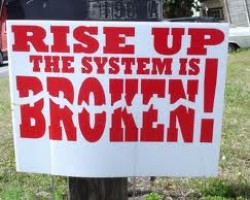
HUNDREDS of YEARS gone in SECONDS!
FDL-
As much as state and federal officials want to describe the foreclosure fraud settlement as a beginning, in many respects it was most certainly an ending. Analysts invested in the meme that “uncertainty” was crippling the housing market now are heavily invested in saying that the clearing of this uncertainty through the settlement will speed up the foreclosure machine. Diana Olick gives a version of that today which makes absolutely no sense, because all the data comes from the fourth quarter of 2011.
But nevertheless, she’s on to something. With state AGs releasing liability for foreclosure fraud, legislators in some key states are picking up where they left off, removing additional barriers to foreclosure, shutting down due process and subverting the implications of judicial rulings.
For example, in Massachusetts, lawmakers have introduced a bill to indemnify buyers of foreclosed properties from title defects that have been exposed by the Ibanez case.
© 2010-19 FORECLOSURE FRAUD | by DinSFLA. All rights reserved.The bill, if approved, will amend the state foreclosure laws to validate a foreclosure, even if it’s technically deficient under the Ibanez ruling, so long as the previously foreclosed owner does not file a legal challenge to the validity of the foreclosure within 90 days of the foreclosure auction.
The bill has support from both the community/housing sector and the real estate industry. Indeed, the left-leaning Citizens’ Housing and Planning Association (CHAPA), non-profit umbrella organization for affordable housing and community development activities in Massachusetts, has filed written testimony in support of the bill.
Properties afflicted with Ibanez title defects, in worst cases, cannot be sold or refinanced. Homeowners without title insurance are compelled to spend thousands in legal fees to clear their titles. Allowing such foreclosed properties to sit and languish in title purgatory is a huge drain on individual, innocent home purchasers and the housing market itself.



So long as the previous owner doesn’t file a challenge to the validity of the foreclosure within 90 days?
A savings clause, to satisfy a “constitutional” challenge?
How would that square-up with the usual 10, 20, or 40 year redemption period?
@nydeemarie
Good to see your name. I didn’t know what happened to you since that site closed.
@nydeemarie
I posted on that site as “likethurgood”
Marilyn, Good to see you too!
I’ve been toying with a few questions/ideas..
I find myself wondering, if now that the Guillaume decision is out, would that apply to 3rd party debt collectors, as well?..
Seriously, does a person ever get know who “really” suing them?
http://mandelman.ml-implode.com/2012/03/new-jersey-supreme-courts-guillaume-decision-meaningless-should-foreclosure-defense-rethink-its-strategy/
and when the legislature’s act in ways that infringe state and federal constitutional rights..
who should bear the cost??
I.A.2.b.iii. Governmental Creation of a Legal or Procedural Framework
A private party may be engaged in “state action” if the act which deprived federal rights could not have occurred but for the existence of a governmental framework requiring government approval or action. In North Georgia Finishing, Inc. v. Di-Chem, Inc.,/107/ the Court found state action in a private party’s invocation of a court-ordered attachment that failed to afford due process to the debtor. Similarly, in Lugar v. Edmondson Oil Company, the Court held that a creditor who invokes prejudgment attachment remedies requiring the participation of a court clerk and a sheriff, acts under color of state law./108/ In contrast, in Flagg Brothers v. Brooks, involving a prejudgment attachment authorized by state law but not requiring the intervention of a court, no state action was found./109/ Finally, in Edmondson v. Leesville Concrete Company, the Court found that a private attorney using peremptory challenges in a jury trial in a racially biased manner was a “state actor” because his act—use of peremptory challenges¾could exist only in the judicial context and with the approval of a state judge./110/ The rule of these cases is that a private party becomes a state actor if he or she uses a state procedure requiring some state intervention.